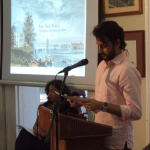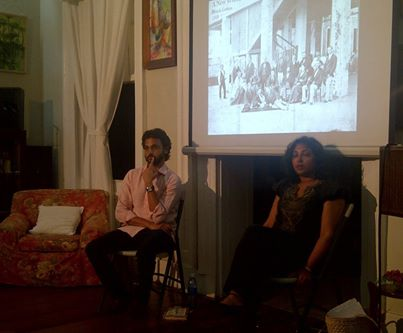Activity: Readings and Discussion
Host: Moray House Trust
Date: Tuesday 13 May 2014
On Tuesday 13th May, Moray House Trust hosted an evening of readings by novelist and cricket writer, Rahul Bhattacharya and journalist / historian Gaiutra Bahadur. Rahul and Gaiutra read to an attentive audience and discussed common themes in their work such as the question of genre, women in Guyanese society, the interplay of fact and imagination, the moral imperative for the writer to present truthfully.

In 2011, Bhattacharya’s novel, ‘The Sly Company of People who Care’, was published to widespread acclaim. In it, he catalogues the adventures of a young Indian journalist in Guyana and depicts with grace, warmth and humour the varied cast of characters and heady cultural mix encountered; the neighbourhood savants, pork-knockers, cane-cutters. “You want bandit, we got bandit,” says one. “We got blackman, redman, buck, chinee, coolie, dougla all lashin each other.”
One reviewer celebrated the ‘authenticity of Bhattacharya’s impressions’ and pronounced it ‘the finest Guyanese novel in a generation.’ Another applauded the book as ‘a deft synthesis of travelogue and Bildungsroman, by turns antic and introspective.’

Last year, Gaiutra Bahadur published ‘Coolie Woman: The Odyssey of Indenture’. In it, she traces the journey of thousands of women like her great-grandmother Sujaria, a 27 year-old immigrant from Bihar who made the journey to British Guiana as an indentured labourer alone and four months pregnant.
Responding to the queries about her provocative choice of title, Bahadur explained in an earlier interview: “If we scrub our words clean, we can’t scrub our history clean. We can’t sanitise it that way. These workers, the indentured laborers, were coolies. This is the way they were seen, and this is how they were put to use in the empire, on plantations. I’m not rebranding them with that stigma by using the word in my title; I’m acknowledging the stigma.” Expanding on the same topic, Bahadur explained that her use of the term “coolie” is metaphorical: the word implies one who bears burdens, and she sees indentured women as having been the quintessential burden bearers—in every sense.
Video clips
Part I:
Part II: Rahul speaks about Guyana
You Tube Clip: http://youtu.be/D2e5gjMKzcM
Part III: Bottom-step philosophers
Rahul read an extract from “The Sly Company of People who Care” in which the narrator describes a clutch of Kitty folk sitting on a bottom-step mulling over items in the news, discussing the issues that arise and illustrating their arguments with increasingly colourful stories.
You-Tube Clip: http://youtu.be/xJtEwAhyxhs
Part IV: Of reggae and chutney
A second extract from ‘The Sly Company of People who Care’ read by the author.
You Tube Clip: http://youtu.be/7srx4o8kcy0
Part V: Gaiutra talks about ‘Coolie Woman’
You Tube Clip: http://youtu.be/HpXgMAEWUJQ
Part VI: Maharani’s departure from India
Gaiutra reads an extract from “Coolie Woman: The Odyssey of Indenture“. Gaiutra quotes directly from the recollections of a female indentured labourer and gives some insight into her reasons for leaving India.
You-Tube Clip:http://youtu.be/LzNk-14meI0
Part VII: In the beginning there was a boat
In this reading from her book, ‘Coolie Woman’, Gaiutra Bahadur traces the ‘creation story of our people’ or the ‘middle passage’ in lyrical prose: ‘In our beginning, there was a boat. On that mad ocean, we came to life…We crossed seven seas: seven shades of water, shades of darkness and light, light that died and darkness that was born, darkness somewhat extinguished and light rekindled.’
You Tube Clip: http://youtu.be/2ErKhLk0190
Part VIII: Sujaria’s journey to Enmore 1903
Gaiutra Bahadur’s ancestor was one of many who made the journey from India to British Guiana to work on the sugar estates as indentured labourers. ‘In her world, one shilling was the value of a human life.’ Ironically, as Bahadur states in a footnote, only 20% of those on plantations were indentured.’The rest were immigrants who had served out their time but still lived and worked on the sugar estates.’
You Tube Clip: http://youtu.be/HsVkkN_XPr4
Part IX: Fiction or non-fiction ? The authors discuss their books
Rahul Bhattacharya and Gaiutra Bahadur, the authors of ‘The Sly Company of People who Care’ and ‘Coolie Woman’ respectively, discuss the blurring between fact and fiction, its value and impact as a narrative device.
You Tube Clip: http://youtu.be/MRfyC0_3nQM
Part X: The ‘gaps and silences’ in the stories of indentured women
Gaiutra Bahadur, author of ‘Coolie Woman’, describes her approach to a history where the principals have left few records of their own.
You Tube Clip: http://youtu.be/YqW7s0sanhk
Part XI: Questions from the floor
Gaiutra faces questions about her choice of title and why indentured labourers left so few written records. Rahul is asked about his narrator’s use of the term ‘Indian fatalism’.
You Tube Clip: http://youtu.be/-ybWY2pDUjw

